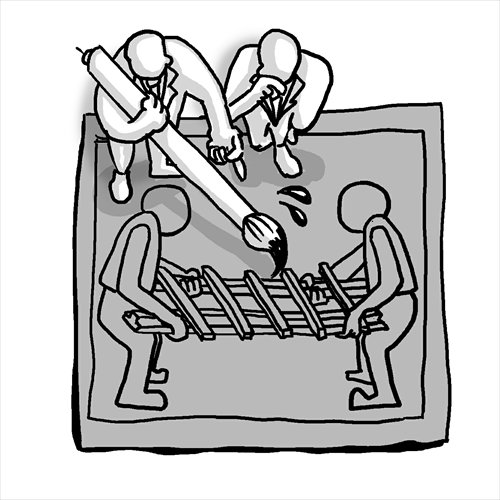UK high-speed rail plans won’t wait for latecomers

Illustration: Lu Ting/GT
China has expressed interest in bidding for contracts under Britain's HS2, a much-delayed high-speed rail project linking London with the north.
However, it may already have missed the last train.
Japanese engineering giant Hitachi attracted wide media interest by announcing it is moving the decision-making center of its rail division to Britain. Unanimous opinion says Hitachi is seeking to shunt its rivals aside for the HS2 project and others in Europe.
Hitachi's new train factory will be based in Newton Aycliffe, a town in Northeast England, where the Japanese company will produce next generation carriages for the country’s backbone “Intercity Express” services under a 5.8 billion pound ($9.61 billion) contract.
It's a symbolic move as the area saw the production of the first steam locomotives almost two centuries ago. Since then, however, the rail industry has failed to pick up steam.
A vacillating government in London could never decide how to handle it. The sector was hemmed in by numerous legal restrictions and starved off investment. State nationalization after World War II was a massive setback with the government continuing to pour money into road transport instead.
Now, the folly of that has come home to roost. Britain lags far behind China and most of its European partners in operating a modern rail sector. Chancellor of the Exchequer George Osborne admitted to parliament recently that Britain had under-invested for decades.
Typically, Britain is still dithering over the full scope of the HS2, which would provide high-speed links to the Midlands (Birmingham) and on to northern cities such as Manchester. One reason is the high cost - an estimated 50 billion pounds - and it would seem that the actual construction will have to largely be borne by the British taxpayer.
However, there's no doubt it has to be built if Britain wants to avoid falling behind in Europe, with the only question being how much foreign involvement will be allowed. There is, for example, scope for a foreign company to actually operate the trains as well as provide the rolling stock.
Premier Li Keqiang raised the issue of Chinese investment when meeting his British counterpart David Cameron last December. Since then, China Railway Group, the Hong Kong-listed subsidiary of the State-owned China Railway Engineering Corp, has specifically offered to build a connection from the HS2's proposed Birmingham station to the city's airport with built-in check-in facilities, and even links to nearby cities.
Ironically, part of this plan would involve reopening a long-closed railway line (a typical scenario in Britain since the network was butchered by the conservative government in the 1950s with massive line closures).
The HS2 project is merely one of several seeking to give Britain a decent rail service at last.
One of the things you need to understand is how history hobbled rail development. In the 19th century, governments did not want railway lines criss-crossing London whether on the surface or underground. Thus, private companies developing the intercity lines built their own termini on the capital's periphery and moving beyond London in any direction involved troublesome changes.
Only now, is that deficiency being overcome.
The first step was Thameslink, a 68-station mainline route running 225 kilometers north to south opened in 1988 but now hopelessly overcrowded. The government is investing 5.5 billion pounds in an expansion and extension scheme, especially to greatly increase capacity on the central London section to accommodate more frequent and longer trains. This is due for completion in 2018.
East-west deficiencies are being tackled through the 118-kilometer "Crossrail," including 42 kilometers of new tunnels under central London, due for completion again in 2018.
Between them, the three rail developments already are making Britain the current focus of rail infrastructure development in Europe.
It is against this background that Hitachi's dramatic intervention has to be seen. The company built its first steam locomotive in 1920 and the high-tech Japanese "bullet train" in 1964.
It is not alone. Both Canadian-owned Bombadier and Germany's Siemens have won contracts for the Crossrail and Thameslink projects respectively.
If China wants a piece of the action it may well have to move as fast as its own highly advanced trains to get on board.
The author is a lecturer with the China Foreign Affairs University. bizopinion@globaltimes.com.cn